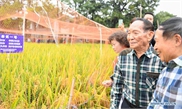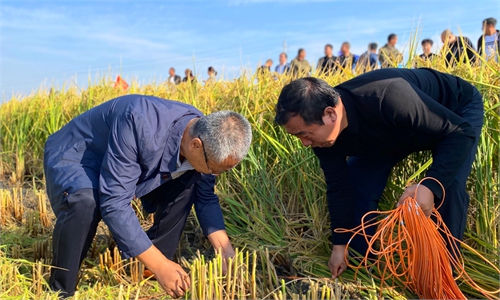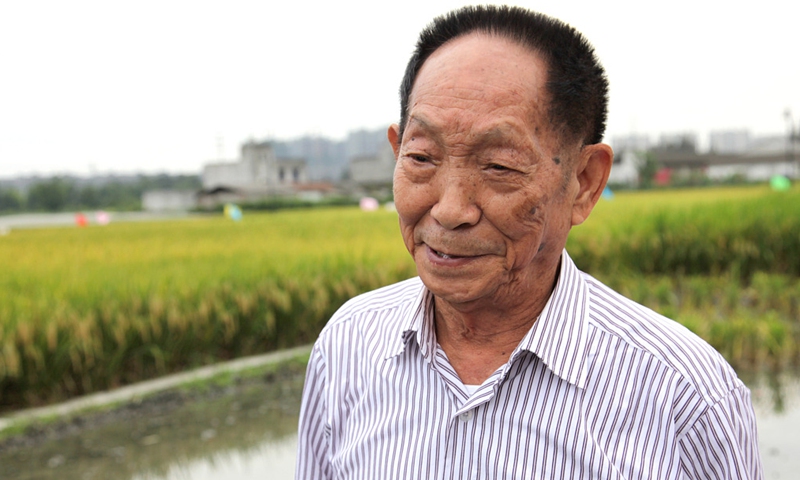
Yuan Longping Photo:CFP
Yuan Longping, widely known as "the Father of Hybrid Rice," died of illness in Changsha at 1:07 pm on Saturday at the age of 91, according to the Xinhua News Agency.
Yuan, the pioneer of the research and development of hybrid rice in China, was the first scientist in the world to successfully utilize the heterosis of rice.
On September 29, 2019, on the eve of the 70th anniversary of the founding of the People's Republic of China on October 1, 1949, Yuan was awarded the "Medal of the Republic". The award speech stated that he had devoted his life to the research, application and promotion of hybrid rice technology, created a super hybrid rice technology system, and made outstanding contributions to China's food security, agricultural scientific development and world food supply.
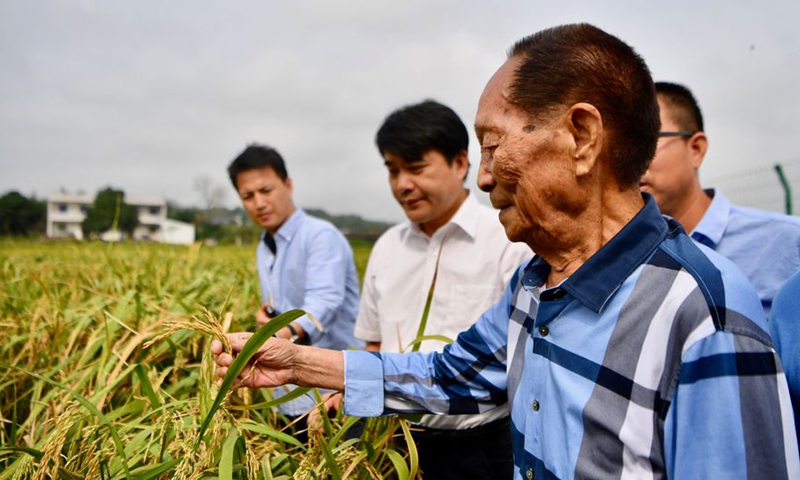
Yuan Longping, known as China's "Father of Hybrid Rice," inspects the new breed in the fields in Hekou Township in Xiangtan City, central China's Hunan Province, Sept. 29, 2017. Photo:Xinhua
Yuan, born in September 1930, hadhelped China work a great wonder ̶ feeding nearly one-fifth of the world's population with less than 9 percent of the world's total land.
Getting enough to eat, however, used to be a serious problem in China. A discovery of a peculiar wild rice species by Yuan in the southern island of Hainan in 1970 became the prelude of China's decades-long effotrts of hybrid rice research. Three years later, he cultivated the world's first high-yielding hybrid rice strain with three lines, namely, the male sterile, maintainer and restorer.
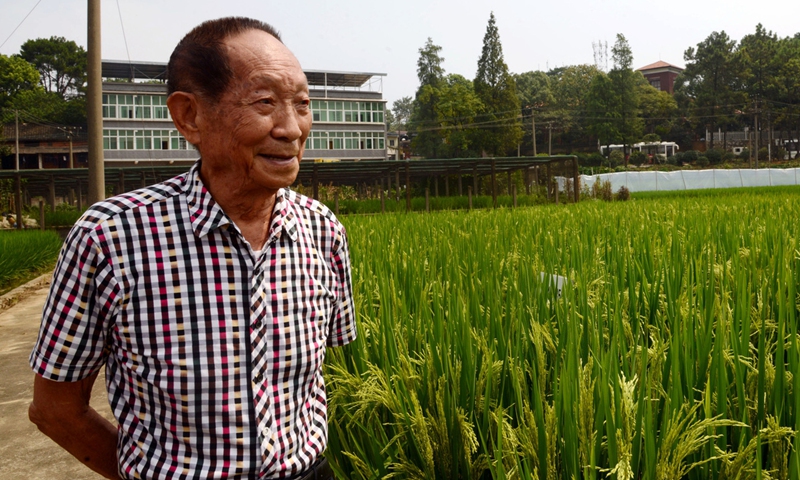
Yuan Longping is dubbed the "Father of Hybrid Rice". Photo:Xinhua
Hybrid rice has since been grown across the country and farmers have reaped incredible output after switching to Yuan's hybrid varieties.
Hybrid rice recorded an annual yield about 20 percent higher than that of conventional rice strains ̶ meaning it could feed an extra 70 million people a year. Now its accumulated planting area in China has exceeded 16 million hectares, with the total grain output reaching 658 billion kilograms (kgs) in 2018, a nearly fivefold increase from that of 1949.
In 1986, Yuan brought up the hybrid rice breeding strategy from the three-line hybrid rice strain to a two-line, and later on to a one-line variety. The two-line technique means that the hybrid rice seeds are cultivated with the male sterile and restorer lines only, which will call for less complicated techniques, save labor and cut costs. Compared with its three-line predecessor, the two-line hybrid rice strain has higher yields and makes use of manpower and material resources more efficiently, according to rice experts.
Yuan's team has continued to make new breakthroughs. The team was invited to make a trial plantation of the saline-alkaline tolerant rice in experimental fields in Dubai in January 2018, and it was another success story for the team. China's export of saline-alkaline tolerant rice and the technique has been eyed as a way to combat the world's food insecurity.
In 1995, local farmers planted 20,000 hectares of two-line hybrid rice in 55 counties on a trial base. The per hectare output reached 8,250 kgs, 1,125 kgs more than that of the three-line strain. The success established China's leading position in the global field of hybrid rice research.
In 1996, the Ministry of Agriculture formally established a super rice breeding program. Four years later, the first phase of the 10.5 tons per hectare target was achieved. The record was shattered three more times with jumps to 12 tons in 2004, 13.5 tons in 2011 and 15 tons in 2014.
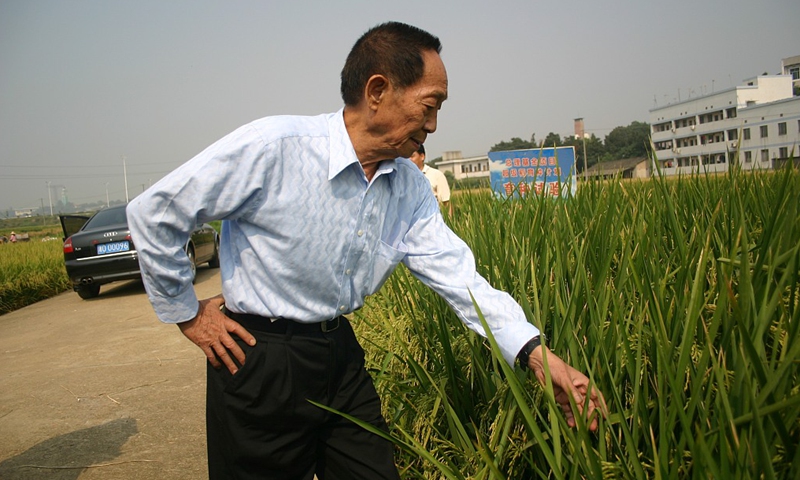
Yuan Longping Photo:CFP
Now the focus of Yuan's hybrid rice project has changed from increasing output to green and sustainable development. In September 2017, a strain of low-cadmium indica rice developed by Yuan's team and the Hunan provincial academy of agricultural sciences was able to reduce the average amount of cadmium in rice by more than 90 percent in areas affected by heavy metal pollution.
After the double-cropping rice exceeded 1,500 kgs per mu last November, Yuan put forward the goal of striving to achieve a yield of 2,000 kgs per mu as soon as possible. While just in early May, the double-cropping rice with a per-mu yield of 3,000 kgs achieved its first harvest in Sanya, South China's Hainan Province. One mu equals roughly 0.067 hectares.
From the Mekong River in Vietnam, Sumatra Island in Indonesia, Indus Plains in Pakistan, to the hilly valleys in Nigeria, hybrid rice has been promoted and introduced to dozens of countries and regions. It now has an overseas planting area of 7 million hectares.
Yuan was also awarded with many international awards, such as Gold Medal Award for the Outstanding Inventor of the United Nations World Intellectual Property Organization, Science Prize of United Nations Educational, Scientific and Cultural Organization, Rank Prize for Agronomy and Nutrition of the United Kingdom, Medal of Honor for Food Security and Sustainable Development of the United Nations Food and Agriculture Organization, and Fukui International Koshihikari Rice Prize of Japan.
"I have always had two dreams: The first dream is to pursue high yield and higher yield of rice; the second dream is having hybrid rice planted throughout the globe. I have always worked hard to make my dream come true, and I hope to encourage you to realize these two dreams together with me," Yuan said.
Global Times - Xinhua
